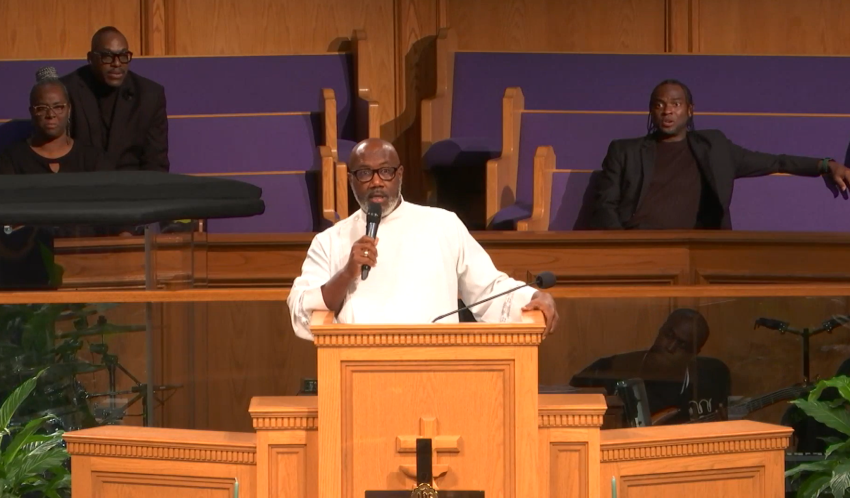Florida pastor who lashed misbehaving students at church school will not be charged

Terence Gray, the senior pastor of Saint Mark AME Orlando, who was accused of child abuse after administering corporal punishment to 16 misbehaving students at a school run by his church last November, will not be charged with a crime, Florida's 9th Judicial Circuit State Attorney Andrew Bain's office announced Wednesday.
"While the senior leader's act of administering corporal punishment is not in question, the State cannot prove there was an intent to inflict physical injury or bodily harm to the children," Bain's office said in a statement after reviewing the facts and evidence.
"Nor can it be proven beyond a reasonable doubt that the senior leader intended to strike the students without authority to act. Florida statute 784.03 defines battery as actual and intentionally touching or striking another person against their will or intentionally causing bodily harm to another person. While the senior leader did strike the children, he did so reasonably believing that he had the authority."
Gray, whose church runs the Alpha Learning Academy, allegedly walked into a fourth-grade classroom on Nov. 2, 2023, and demanded to know which students were misbehaving, WFTV reported.
"He said that he was going to whip us with a belt because we'd been bad," student Shane Walker told the news outlet.
Gray allegedly asked misbehaving students to stand in the class to avoid stricter punishment. The teacher also pointed out others that needed to be punished, and only a few students from the class were reportedly exempted from three lashes each from Gray's belt.
Walker's mother, Janesha Martin, told the local news outlet that her son suffered bruises on his upper leg from the lashes. She joined with other parents to complain about Gray's choice of discipline.
"This makes me really emotional," she explained. "I don't send my child to school to be abused by anyone."
Martin said she never consented to corporal punishment for her son when she decided to send him to the school. She removed him from the institution after the incident.
"The pastor should have been arrested," she said.
In their investigation of the case, which was transferred to Bain's office, officers from the Orlando Police Department found previous versions of the school's parent handbook that include a provision for corporal punishment as an alternative to home suspension.
However, the school's 2023-2024 parent handbook did not include that provision.
"Officers stated in their report that it is unclear which version of the handbook parents received," the state attorney's office explained.
"The senior leader admitted to police that he administered the spankings, stating he had warned students about the potential for it if they continued misbehaving, which was consistent with the prior handbook's requirement. He told officers the school's principals and counselors had previously used corporal punishment in prior years. The official said he was unaware of the change to the handbook," the statement added.
Under Florida law, teachers and school personnel have the authority to "maintain discipline within the scope of parental expectations and practices and exempts them from potential criminal charges," the state attorney's office stated.
U.S. Secretary of Education Miguel Cardona advocated against corporal punishment in a letter to governors, chief state school officers, school districts and school leaders last year.
The secretary noted that 23 states allow corporal punishment in schools or have not explicitly prohibited the practice. Most states and the District of Columbia have banned the practice in public schools.
Corporal punishment is legal in Alabama, Arkansas, Arizona, Florida, Georgia, Idaho, Kentucky, Louisiana, Mississippi, Missouri, North Carolina, Oklahoma, South Carolina, Tennessee, Texas and Wyoming. It cannot be used, however, for students with disabilities in Kentucky, Louisiana, Mississippi, Oklahoma and Tennessee.
According to the Department of Education, other states that do not expressly prohibit corporal punishment in schools are Colorado (prohibits only for students with disabilities), Connecticut, Kansas, Indiana, Maine, New Hampshire and South Dakota.
"Florida statute 827.03 also states child abuse requires the intentional infliction of physical injury or an intentional act reasonably expected to cause injury to a child. It is not reasonable to expect three lashes over clothing would cause an injury and this incident does not meet the statutory requirements for child abuse under Florida law," Bain's office added.
"After reviewing the case, our office does not believe it can be proven beyond a reasonable doubt, and our ethical standards prohibit us from filing charges."
Contact: leonardo.blair@christianpost.com Follow Leonardo Blair on Twitter: @leoblair Follow Leonardo Blair on Facebook: LeoBlairChristianPost



























